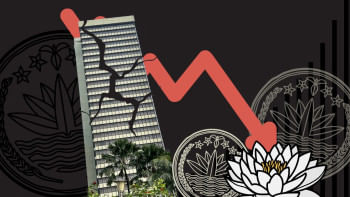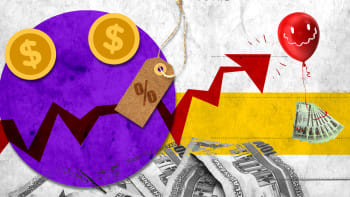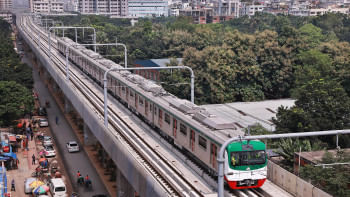2023 will be the year of inflation and financial turpitude

Despite dreamy projections from financial authorities and sweet words from ministers, the year 2023 will remain a turbulent time for the financial industry of Bangladesh. Inflation will torment the lower and lower-middle income population, who will lose a big segment of their savings and also have less purchasing power.
While infrastructural development projects such as the Padma Bridge, Dhaka's metro, new railways, power plants and the like will add efficiency and productivity to the economy, a significant amount of this gain will be eroded by inflation and growing financial turpitude in both the banking sector and stock markets – demanding stricter vigilance in these fields.
In most countries, combating inflation rests on the shoulders of their central banks. In Bangladesh, the water is muddied by government activities that impinge on the central bank's policy space. The finance ministry dictates interest rates on both deposit and lending, making the main central bank weapon of controlling inflation largely blunt.
Fighting inflation will hence require a journey that is tardier and lengthier than usual, and it is likely that inflation will dominate the entirety of the new year. A weak taka will only add fuel to the fire through import channels. Fear or expectations and downward rigidity of prices will impede the easing of inflation, although international fuel and commodity prices will fall.
Coming up with the annual national budget will be a great challenge because of the dwindling ratio of revenue to GDP. The budget authority usually draws a big amount of funds by selling saving certificates at higher non-market rates – the most expensive way of financing in the name of supporting women and the poor, even though it ends up helping the rich the most. However, 2023 will not see an upward trend in sanchayapatra sales because of consumers' loss of purchasing power. The net sale of these certificates is already in the negative zone. Since the honeymoon with sanchayapatra seems to be over, the finance ministry will aggressively encroach on the banking space to borrow funds – a behaviour termed as the crowding-out effect by economists, leaving smaller room for private borrowers and credit growth.
In 2023, the banking industry will face the challenge of mobilising deposits – which we have already witnessed in the latter part of 2022. Providing the ministry with funds will be difficult for the central bank, as a result. The budget to be made in 2023 will also be the current administration's last chance before elections, so the government will try its best to finish its development commitments and offer more benefits under social safety-net programmes. Increasing revenue by raising taxes, particularly on the rich, will remain undesirable in an election year. Rather, businessmen will try to take advantage by not paying default loans and not honouring their tax liabilities wilfully.
This means the gap between revenue and spending will be widened in 2023, making fiscal deficits reach an unconscionable figure that will be hard for the banking industry to accommodate. Since the government controls the lending rate at nine percent, which is close to inflation, drawing funds from banks by the super-rich turns out to be borrowing at almost zero cost.
This will only press the pedals for credit growth. And when credit growth is high and deposit growth falls far behind it, banks suffer from a terrible shortage of loanable funds and seek government support. Such a liquidity crisis in the banking sector will tighten their profit opportunities, discouraging them to expand the workforce and adding salt to the open wound of high unemployment.
The entire scenario seems just like the economist Ragnar Nurkse's vicious circle of poverty, which originates from poverty and ends there as well, by making it worse. Here, the vicious circle of fiscal incapacity will encroach on the banking space without displeasing the superrich, and eventually will worsen the tax-GDP ratio. Already, the ministry lags far behind its target of revenue collection. Fiscal incapacity is at the root of all major financial ills in the Bangladeshi economy, and this will remain so in 2023 as well. It is incapacity, or indulgence, or both.

On top of that, import growth will be restricted by austerity measures, which will impact GDP growth partially. Export growth may remain buoyant given stable demand in the west, but remittances are unlikely to grow satisfactorily given the non-market exchange rate and the lethargic formalities of remittance through formal channels. Hundi will still hijack a big segment of remittance, no matter what punishing measures are in place. The current account deficit will, as a result, remain high in 2023, if not higher than what the country had in 2022, and continue to exert pressure on foreign currency reserves.
Unfortunately, the new year is likely to see more defaulters come out the woodwork and damage depositors' confidence even more. The government is unlikely to change the directorship law, whose implementation in early 2018 has deteriorated the loan default situation, as well as corporate culture. There does not seem to be any silver lining on the horizon for the banking landscape. Demands for changes will emerge from economists and professionals, but the government will not take on any massive reform in the election year. However, they will be more proactive in making progress with its megaprojects because of their positive impact on public sentiment.
In fact, it would not come as a surprise if the finance minister decides to redefine default loans, giving even more leeway to the habitual bank looters and compelling the central bank to abide by his sugarcoated policies. Nor would it be unusual if money launderers are offered further incentives in the budget for FY2024, giving greater momentum to both bank defaulters and money launderers, who are two sides of the same coin.
What this means is that, while the government is preoccupied with election campaigns and political agitations, financial turpitude will continue to rise. And, unfortunately for us all, fighting inflation will take a backseat in the priority list of policymakers.
Dr Birupaksha Paul is a professor of economics at the State University of New York at Cortland in the US, and former chief economist at Bangladesh Bank.

 For all latest news, follow The Daily Star's Google News channel.
For all latest news, follow The Daily Star's Google News channel. 







Comments